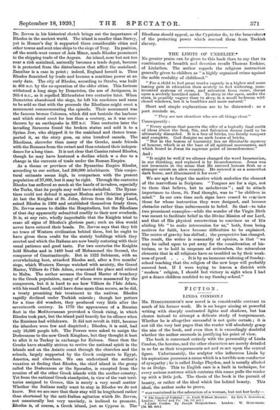THE LIMITS OF UNBELIEF.* No greater praise can be given
to this book than to say that its combination of breadth and devotion recalls Thomas Erskine, of Linlathen. The author regards the religious instruction generally given to children as " a highly organized crime against the noble credulity of childhood."
" For a child to feel great truths vaguely is a higher and more lasting gain in education than acutely to feel withering, man- invented systems of curse, and salvation from curse, thrust upon a secretly horrified mind. To sleep in the open, under the stars, is possibly vaguer than to sleep in a small bedroom with closed windows, but it is healthier and more natural."
Short and simple explanations are to be distrusted : as a poet reminds us,
"They see not clearliest who see all things clear." Consequently :
" Every system that asserts the offer of a logically Carol outfit of ideas about the Soul, Sin, and Salvation dooms itself to be ultimately discarded. It is a box of bricks, too fatally compact and complete. God designs no such boxes of bricks.
" But in the bosom of humanity lies an illimitable mystery of honour, which is at the base of all spiritual movements, and which found in Jesus its supreme point of incandescence."
And :
"It might be well if we oftener changed the word Incarnation, in our thinking, and replaced it by Incandescence. Jesus was not incarnate in the sense that He entered human flesh as a stranger enters an alien country. He entered it as a somewhat dark home, and illuminated it for over."
We are apt to forget the motive which underlies the element of the marvellous in Scripture. " Tongues are for a sign, not to them that believe, but to unbelievers " ; and to attach importance to them, St. Paul thought, was to " be children in mind." In our own time such signs have ceased to cc:rime those for whose instruction they were designed, and become obstacles rather than inducements to belief. So that—to take two prominent examples—while the wonder of the Virgin Birth was meant to facilitate belief in the Divine Mission of our Lord, and that of His physical resurrection to convince us of His abiding life " to make intercession for us," both, from being motives for faith, have become difficulties to bo explained. The centre of gravity has shifted ; the perspective has changed. The result, the writer is reasonably of opinion, is that " we may be called upon to put away for the consideration of his- torians, or to hold in suspense ad avirandunt, the miraculous elements that in all religions have so troubled us by their weak- ness of proof. . . . It is by an immense widening of Sunday. school teaching that the religion of the new hope will probably succeed best. If I were trying to leaven a district with ' modern ' religion, I should feel victory in sight when I had got a dozen children confided to my Sunday-school."






































 Previous page
Previous page